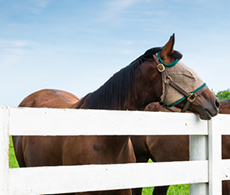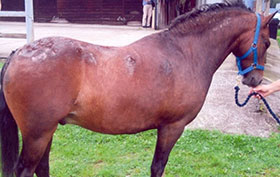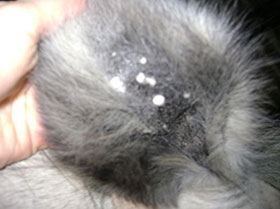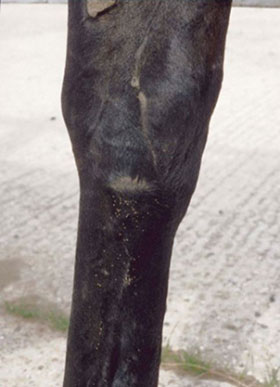
How to prevent flies on horses
Petplan Equine veterinary expert Gil Riley provides some advice on how to deal with the problem of flies around horses this summer.
While summer brings longer days and the promise of warm, sunny weather, it also brings flies and other biting insects that can make life a misery for horse and rider alike.
There are five main types of fly that should concern horse owners:
- Culicoides (biting midge). This fly is responsible for the allergic skin condition known as sweet itch.

Sweet itch caused by culicoides midges
- Horse fly. This fly is most populous in woods and shaded areas. Horse-fly bites often cause large local reactions in the skin and riders can be a target, as well as horses.
- House fly. House flies like to feed on mucous secretions, especially around the eyes, and transfer infections causing conjunctivitis.
- Simulian (black fly). These are small, biting flies, similar to Culicoides. They target the head area, especially the inside of the ears. They spread the Papova virus, which causes the raised white areas on the inside of many horses’ ears that are known as aural plaques.

Aural plaques spread by the blackfly
- Bot fly. This is a very large fly with a large undercarriage, which carries bundles of eggs. When horses groom themselves or others, eggs can be transferred into the mouth where they burrow into the tissues as larvae and find their way to the stomach, which can cause stomach ulceration.

Bot eggs adhering to legs
Strategies for preventing and controlling flies on horses
Here are some simple tips that you can apply to your summer routine to help prevent flies on horses:
1. Protect the stable yard
There are two main areas in a stable yard that are particularly suitable for fly breeding: the muck heap and any stagnant water. Paying careful attention to these areas can decrease the population of flies in any yard.
- Muck heap: Ideally, the muck heap should be covered with black plastic, and the cover pulled back only to make a wheelbarrow deposit. As the muck heap ferments away under the cover, the temperature will increase and fly eggs, or any developing fly larvae, will be destroyed.
- Stagnant water: Any ditches should be drained and water should not be allowed to gather in old buckets or containers lying around the yard.
2. Avoid risky times and places
Culicoides midges are most prevalent at dawn and at dusk. So, if possible, keep your horse in their stable at these times.
The horse fly is most present in wooded, shady areas, so avoid hacking through any woods, especially on warm days.
3. Remove bot eggs
Use a specially designed comb to remove bot eggs from your horse each day (or more often if possible). Worm your horse after the first frost of autumn with an Ivermectin-based wormer to remove any bots that have managed to set up home in the stomach.
4. Use protective wear
Using a fly-protection rug is vital to prevent Culicoides midges getting access to your horse. It is especially important for those horses that have allergic reactions to the fly saliva – in other words, horses that suffer from sweet itch.
A fly mask that covers the ears and eyes is an excellent deterrent and good at preventing both the house fly (eyes) and the black fly (ears) from gaining access to their preferred feeding sites on your horse.
5. Investigate fly repellents
There is a wide range of sprays, creams, gels and wipes on the market containing a variety of active ingredients, from traditional natural solutions to powerful synthetic substances. It is generally acknowledged that some of the most popular natural remedies, including extracts of lavender, rosemary, tea tree and eucalyptus, do have repellent qualities. Adding garlic to a horse's diet has also long been recommended as a way of deterring flies.
While many owners prefer natural remedies to the synthetic products on the market, they are not necessarily more effective. It is probably best to ask other owners at your livery yard which remedy they find most useful, as that is the one most likely to work for you and your horse, in the same environment.
Remember, fly repellents will only be effective for a limited time. Reapplication during the day is advised to keep levels high, especially if it rains, since repellents are not waterproof. They will be washed off in wet weather and your horse will not be protected.
What are your top tips for preventing and controlling flies in summer? Tell us on Facebook @PetplanEquineUK


